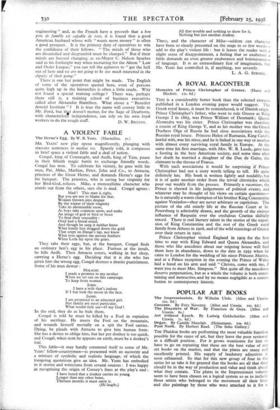A VIOLENT FABLE
The Herne's Egg. By W. B. Yeats. (Macmillan. 5s.)
MR. YEATS' new play opens magnificently, plunging with staccato sentences in medias res. Sparely told, it compasses in brief space a violent fable and a deal of action.
Congal, king of Connaught, and Aedh, king.of Tara, pause in their fiftieth magic battle to exchange friendly words.
Congal has won. To celebrate his victory, he goes with his men, Pat, Mike, Mathias, Peter, John and Co., to Attracta, priestess of the Great Herne, and demands Herne's eggs for his banquet. The priestess, who is saving her virginity for her Bird-God, refuses. Mike, a monosyllabic character who stands out from the others, says she is mad. Congal agrees :
Mad ! This man is right, But you are not to blame for that. Women thrown into despair
By the winter of their virginity Take its abominable snow, As boys take common snow, and make An image of god or bird or beast To feed their sensuality : -Ovid had a literal mind, And though he sang it neither knew What lonely lust dragged down the gold That crept on Danae's lap, nor knew What rose against the moony feathers When Leda lay upon the grass.
They take their eggs, but, at the banquet, Congal finds an ordinary hen's egg in his place. Furious at the insult, he kills Aedh. Then Attracta enters, walking in her sleep, carrying a Heme's egg. Deciding that it is she who has given him the wrong egg, Congal decrees a drastic punishment. Some of his men demur :
MALACHI.
I made a promise to my mother When we set out on this campaign To keep from women.
JOHN.
I have a wife that's jealous If I but look the moon in the face.
JAMES.
I am promised to an educated girl.
Her family are most particular, What would they say-0 my God !
In the end, they do as he bids them.
Congal is told he must be killed by a Fool in expiation of his sacrilege. He meets the Fool on the mountain, and wounds himself mortally on a spit the Fool carries.
Dying, he pleads with Attracta to give him human form.
She has a device to oblige him, but her pet donkey is too quick, and Congal, when next he appears on earth, must be a donkey's foal.
This fable—it may hardly commend itself to some of Mr. Yeats' fellow-countrymen—is presented with an austerity and a mixture of symbolic and realistic language, of which the foregoing quotations give an idea. Mr. Yeats has embodied in it stories and witticisms from several sources : I was happy in recognising the origin of Corney's lines at the play's end : I have heard that a donkey carries its young Longer than any other beast, Thirteen months it must carry it. (He laughs.) All that trouble and nothing to show for it, Nothing but just another donkey.
These, and the character of Mike—seldom can character have been so clearly presented on the stage in so few words—
add to the play's violent life : but it leaves the reader with a slight sense of disappointment, a feeling that so exuberant a fable demands an even greater exuberance and boisterousness of language. It is an extraordinary feat of imagination, but Mr. Yeats has controlled it, if anything, too severely.
L. A. G. STRONG.
















































 Previous page
Previous page